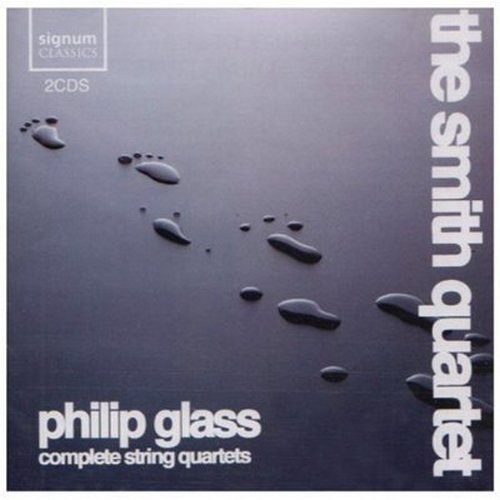
The Smith Quartet - Philip Glass - Complete String Quartets (2008)
BAND/ARTIST: The Smith Quartet
- Title: Philip Glass - Complete String Quartets
- Year Of Release: 2008
- Label: Signum Records
- Genre: Classical
- Quality: FLAC (image+.cue)
- Total Time: 01:28:25
- Total Size: 465 Mb
- WebSite: Album Preview
Tracklist:
CD 1:
01-06 String Quartet No. 3 "Mishima" (1985)
07-10 String Quartet No. 2 "Company" (1984)
11-13 String Quartet No. 4 "Buczak" (1989)
CD 2:
01-02 String Quartet No. 1 (1966)
03-07 String Quartet No. 5 (1991)
Performers:
The Smith Quartet
Ian Humpheries, violin
Darragh Morgan, violin
Nic Pendlebury, viola
Deirdre Cooper, cello
CD 1:
01-06 String Quartet No. 3 "Mishima" (1985)
07-10 String Quartet No. 2 "Company" (1984)
11-13 String Quartet No. 4 "Buczak" (1989)
CD 2:
01-02 String Quartet No. 1 (1966)
03-07 String Quartet No. 5 (1991)
Performers:
The Smith Quartet
Ian Humpheries, violin
Darragh Morgan, violin
Nic Pendlebury, viola
Deirdre Cooper, cello
By 2008, Philip Glass had written five string quartets, between 1966 and 1991, and the British Smith Quartet has collected them all in this Signum release. The album is an intriguing testimony to the variety of Glass' output and the ways his music has evolved. The first quartet, in two slow movements, written in 1966 soon after he had completed his studies with Nadia Boulanger and had had his first exposure to the music of Ravi Shankar, would probably not be recognizable as a work by Glass to listeners only familiar with his "music with repetitive structures." While it does incorporate varied repetitions of the same thematic material, it has none of the austere rigor of the composer's earliest minimalist works, is thoroughly chromatic, and has some of the melancholic introspection of Shostakovich. His second, third, and fourth quartets are typical of the composer's most familiar and popular work, using a tonal language and the repetitive structures for which Glass is best known, and all three have programmatic roots. The second is derived from incidental music for Beckett's Company, the third from the film score Mishima, and the fourth a memorial tribute to his friend Brian Buczak. The fifth is most closely related to the first in its use of dissonance and its freedom from complete reliance on repetitive patterns. Although it does include some typically Glassian repetitions, it seems expressively freer and more flexible than the quartets that preceded it, and there are sections where the string writing is more idiomatic.
The string quartet doesn't seem like an ensemble especially well suited to Glass' typical style. Particularly in the second and third quartets, the string writing is perfunctory and predictable, and lacks much subtlety or variety. The first quartet, with its roots still firmly in the string quartet tradition, is more inventively scored, and the fourth has such a strongly lyrical melodic impulse that the conventionality of its accompanying lines is less bothersome. The fifth is a satisfying synthesis that is obviously Glass' work, but that has some of the variety and complexity of the first quartet. The Smith Quartet's performances are straightforward and energetic. One gets the sense there isn't a lot to work with in the middle quartets in order to create much of an expressive bond with the listener. In the first, fourth, and fifth quartets, though, the group is genuinely communicative. Signum's sound is clear, intimate, and nicely resonant.
The string quartet doesn't seem like an ensemble especially well suited to Glass' typical style. Particularly in the second and third quartets, the string writing is perfunctory and predictable, and lacks much subtlety or variety. The first quartet, with its roots still firmly in the string quartet tradition, is more inventively scored, and the fourth has such a strongly lyrical melodic impulse that the conventionality of its accompanying lines is less bothersome. The fifth is a satisfying synthesis that is obviously Glass' work, but that has some of the variety and complexity of the first quartet. The Smith Quartet's performances are straightforward and energetic. One gets the sense there isn't a lot to work with in the middle quartets in order to create much of an expressive bond with the listener. In the first, fourth, and fifth quartets, though, the group is genuinely communicative. Signum's sound is clear, intimate, and nicely resonant.
As a ISRA.CLOUD's PREMIUM member you will have the following benefits:
- Unlimited high speed downloads
- Download directly without waiting time
- Unlimited parallel downloads
- Support for download accelerators
- No advertising
- Resume broken downloads


